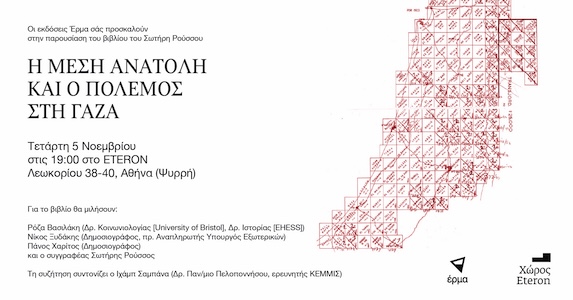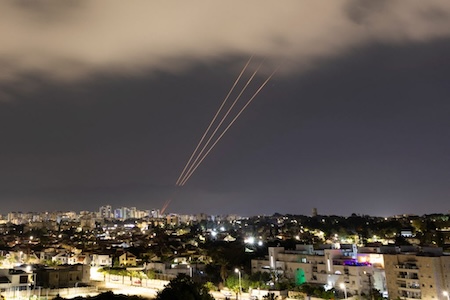
Οι εκδόσεις Έρμα και το Κέντρο Μεσογειακών, Μεσανατολικών και Ισλαμικών Σπουδών (ΚΕΜΜΙΣ) του Τμήματος Πολιτικής Επιστήμης και Διεθνών Σχέσεων του Πανεπιστημίου Πελοποννήσου σας προσκαλούν στην παρουσίαση του βιβλίου του Σωτήρη Ρούσσου:
«Η Μέση Ανατολή και ο πόλεμος στη Γάζα Ερμηνευτικά σχήματα και περιφερειακοί συσχετισμοί»
 Το Κέντρο Μεσογειακών, Μεσανατολικών και Ισλαμικών Σπουδών (ΚΕΜΜΙΣ) του Τμήματος Πολιτικής Επιστήμης και Διεθνών Σχέσεων του Πανεπιστημίου Πελοποννήσου σας προσκαλεί στην εκδήλωση-συζήτηση:
Το Κέντρο Μεσογειακών, Μεσανατολικών και Ισλαμικών Σπουδών (ΚΕΜΜΙΣ) του Τμήματος Πολιτικής Επιστήμης και Διεθνών Σχέσεων του Πανεπιστημίου Πελοποννήσου σας προσκαλεί στην εκδήλωση-συζήτηση:
«Οι ερευνητές του ΚΕΜΜΙΣ συζητούν: Ο πόλεμος στη Μέση Ανατολή»
 Donald Trump’s latest post on his account, in which he presents his vision to transform and reconstruct Gaza into a Riviera by displacing 2.1 million Palestinians, absurd as it may seem, unravels two distinct assumptions: first, it is merely an indifferent contribution to a puzzling situation that has remained unresolved since the beginning of the previous century; and second, it is yet another proposition that excludes one of the key variables in the equation: the Palestinians.
Donald Trump’s latest post on his account, in which he presents his vision to transform and reconstruct Gaza into a Riviera by displacing 2.1 million Palestinians, absurd as it may seem, unravels two distinct assumptions: first, it is merely an indifferent contribution to a puzzling situation that has remained unresolved since the beginning of the previous century; and second, it is yet another proposition that excludes one of the key variables in the equation: the Palestinians.
 Κατά τη διάρκεια της πρώτης περιόδου της Ισλαμικής Δημοκρατίας διαμορφώνονται δύο τάσεις στην διαμόρφωση αποφάσεων της εξωτερικής πολιτικής. Η μία είναι η πιο ριζοσπαστική και η άλλη η πραγματιστική.
Κατά τη διάρκεια της πρώτης περιόδου της Ισλαμικής Δημοκρατίας διαμορφώνονται δύο τάσεις στην διαμόρφωση αποφάσεων της εξωτερικής πολιτικής. Η μία είναι η πιο ριζοσπαστική και η άλλη η πραγματιστική.

On October 7, 2023, President Biden declared his administration’s “rock-solid and unwavering support” to Israel. More than nine months into the Gaza war, his adherence to his initial promise is unquestionable. This article will examine US foreign policy vis-à-vis the war on Gaza, focusing on its prospective objectives and its implications on domestic, regional, and international levels. It will also argue that American foreign policy on the issue is primarily reactive rather than proactive.
 Η επίθεση του Ισραήλ στο ιρανικό προξενείο της Δαμασκού και η δολοφονία πέντε ανώτατων και ανώτερων Ιρανών αξιωματικών μπορεί να αποδοθεί σε τρεις λόγους που είναι σε μεγάλο βαθμό αλληλένδετοι. Πρώτον, είναι πιθανό ότι αποτελεί προοίμιο μιας γενικής επίθεσης του Ισραήλ κατά της Χεζμπολάχ ανάλογη με αυτή εναντίον της Χαμάς μετά το τέλος της επίθεσης στη Γάζα. Η δολοφονία των Ιρανών ανώτατων αξιωματικών που ήταν υπεύθυνοι για τη Συρία, τον Λίβανο και την Παλαιστίνη αποδυναμώνει πολύ την επιτελική αποτελεσματικότητα της Χεζμπολάχ τους επόμενους μήνες. Δεύτερον, η επίθεση είναι ένα μήνυμα προς τις ΗΠΑ μετά την στάση τους στο Συμβούλιο Ασφαλείας του ΟΗΕ. Το μήνυμα είναι ότι το Ισραήλ θέτει τις στρατηγικές προτεραιότητες στη Μέση Ανατολή και όχι η Ουάσιγκτον.
Η επίθεση του Ισραήλ στο ιρανικό προξενείο της Δαμασκού και η δολοφονία πέντε ανώτατων και ανώτερων Ιρανών αξιωματικών μπορεί να αποδοθεί σε τρεις λόγους που είναι σε μεγάλο βαθμό αλληλένδετοι. Πρώτον, είναι πιθανό ότι αποτελεί προοίμιο μιας γενικής επίθεσης του Ισραήλ κατά της Χεζμπολάχ ανάλογη με αυτή εναντίον της Χαμάς μετά το τέλος της επίθεσης στη Γάζα. Η δολοφονία των Ιρανών ανώτατων αξιωματικών που ήταν υπεύθυνοι για τη Συρία, τον Λίβανο και την Παλαιστίνη αποδυναμώνει πολύ την επιτελική αποτελεσματικότητα της Χεζμπολάχ τους επόμενους μήνες. Δεύτερον, η επίθεση είναι ένα μήνυμα προς τις ΗΠΑ μετά την στάση τους στο Συμβούλιο Ασφαλείας του ΟΗΕ. Το μήνυμα είναι ότι το Ισραήλ θέτει τις στρατηγικές προτεραιότητες στη Μέση Ανατολή και όχι η Ουάσιγκτον.
 As the Russian invasion of Ukraine continues in full gear, contrary to the steadfast reactions of the western world, the regional responses from the Middle East paint a different picture. Having initially been caught off-guard with the intensifying tag between Russia and the west, most ‘heavyweight’ MENA countries have adopted a ‘sit tight and assess’ approach. Longstanding partners of the west are balancing their reactions in order to minimize the risks stemming from overtly picking sides in a conflict that they increasingly see as not their own. On the region’s eastern flank, Iran too, walks a thin line.
As the Russian invasion of Ukraine continues in full gear, contrary to the steadfast reactions of the western world, the regional responses from the Middle East paint a different picture. Having initially been caught off-guard with the intensifying tag between Russia and the west, most ‘heavyweight’ MENA countries have adopted a ‘sit tight and assess’ approach. Longstanding partners of the west are balancing their reactions in order to minimize the risks stemming from overtly picking sides in a conflict that they increasingly see as not their own. On the region’s eastern flank, Iran too, walks a thin line.
Το Κέντρο Μεσογειακών,Μεσανατολικών και Ισλαμικών Σπουδών φιλοξενεί πληθώρα διαφορετικών απόψεων στα πλαίσια του ελεύθερου ακαδημαϊκού διαλόγου. Οι απόψεις αυτές δεν αντανακλούν υποχρεωτικά τις απόψεις του Κέντρου. Η χρήση και αναπαραγωγή οπτικοακουστικού υλικού για τις ανάγκες της ιστοσελίδας του ΚΕΜΜΙΣ γίνεται για ενημερωτικούς, ακαδημαϊκούς και μη κερδοσκοπικούς σκοπούς κατά τα προβλεπόμενα του Νόμου 2121/1993 (ΦΕΚ Α' 25/4-3-1993) περί της προστασίας της πνευματικής ιδιοκτησίας, καθώς και του άρ.8 του Νόμου 2557/1997 (ΦΕΚ Α' 271/1997).

